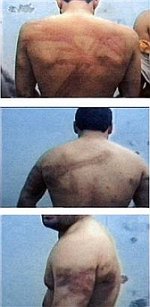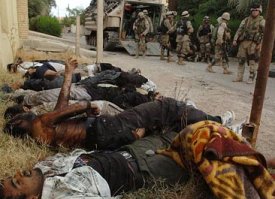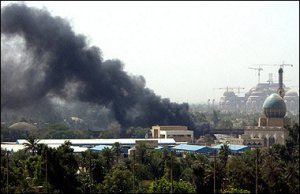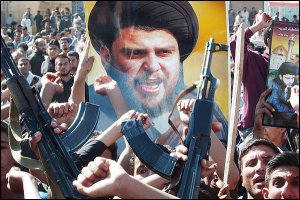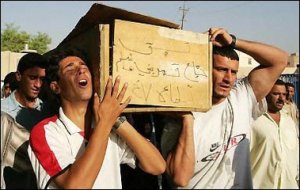Feature Archives
Wed Dec 14 2005
One Thousand Days Of War
One thousand days ago today, the U.S. invasion of Iraq officially began. Reports show the death toll continues to mount to staggering numbers as support for the occupation drops. (Democracy Now Report)
A study released last year on the number of deaths in Iraq put the toll at more than 100,000. (This American Life: What's In a Number?) 82% of Iraqis are "strongly opposed" to presence of coalition troops and 67 per cent Iraqis feel less secure because of occupation and there is perhaps as much as a 40 per cent unemployment rate in the country (The war in numbers).
A study released last year on the number of deaths in Iraq put the toll at more than 100,000. (This American Life: What's In a Number?) 82% of Iraqis are "strongly opposed" to presence of coalition troops and 67 per cent Iraqis feel less secure because of occupation and there is perhaps as much as a 40 per cent unemployment rate in the country (The war in numbers).
Thu Nov 17 2005
Evidence Of Torture In Iraqi Jails
On November 13th repeated enquiries by parents of a missing teenager resulted in US forces raiding a building in Baghdad that turned out top be a secret jail run by Iraqi security forces.
Witnesses said many of the 169 men and youths found inside were emaciated and looked like "Holocaust survivors". Some had suffered beatings so severe that their skin had peeled off, "because of the appalling overcrowding, some of the most badly treated were squashed on to floors and their skins got stuck to the floor." Three men had been kept locked in a cupboard where they could not move while the rest were packed, blindfolded, into three rooms nine feet long and 11 feet wide. Instruments of torture and beating were found hidden in a false ceiling.
Hussein Kamal, the deputy interior minister, told journalists after visiting the scene: “I’ve never seen such a situation like this during the last two years in Baghdad. This is the worst. I saw signs of physical abuse by brutal beating, one or two detainees were paralysed and some had their skin peeled off various parts of their bodies.”
Leading Sunni politicians are demanding an international inquiry. They claim such abuse was regularly carried out by paramilitaries connected to the government and accuse US forces of giving it "the green light". " "According to our knowledge, regrettably, all the detainees were Sunnis," Mohsen Abdul-Hamid, head of the Iraqi Islamic Party, told the Associated Press news agency. "In order to search for a terrorist, they used to detain hundreds of innocent people and torture them brutally." "We insist on having an international investigation," Islamic Party spokesman Alaa Makki told AFP. "There have been similar cases in the past and investigations into them led to nothing," said another party spokesman, Ayad Samarrai. The UN's top human rights official has also called for an international probe into the conditions for detainees in Iraq.
Torture centre discovered in Baghdad | State denial adds insult to torture victims’ injuries | Baghdad Burning: House of Horrors... | Juan Cole: The Skin is Peeling off the New Iraq | Juan Cole: Iraqi Prisoner Abuse | Stirring memories of a bygone era
The use of torture in Iraq has not been limited to Iraqi militia members. A former U.S. Army interrogator recently described to Democracy Now his use of harsh interrogation techniques on prisoners including dogs, sleep deprivation, prolonged isolation and dietary manipulation. The US Army is also investigating whether U.S. soldiers put Iraqis in a lion cage to scare them into giving information and a senior United Nations official has accused US-led coalition troops of depriving Iraqi civilians of food and water in breach of humanitarian law. While Bush recently claimed that "We don’t torture", Cheney hs been trying to pressure senators into exempting the CIA from a proposed amendment that would ban “cruel, inhuman, and degrading treatment” of prisoners in US custody. Proof that US soliders have engaged in torture was made clear in 2004 when photos were leaked of abuses at the Abu Ghraib prison.
Cheney's Torture Policy | Can The CIA Legally Kill a Prisoner?
Past Coverage Of Torture In Iraq: US Charged With War Crimes | Pictures Emerge Of US And UK Torture Of Prisoners
Leading Sunni politicians are demanding an international inquiry. They claim such abuse was regularly carried out by paramilitaries connected to the government and accuse US forces of giving it "the green light". " "According to our knowledge, regrettably, all the detainees were Sunnis," Mohsen Abdul-Hamid, head of the Iraqi Islamic Party, told the Associated Press news agency. "In order to search for a terrorist, they used to detain hundreds of innocent people and torture them brutally." "We insist on having an international investigation," Islamic Party spokesman Alaa Makki told AFP. "There have been similar cases in the past and investigations into them led to nothing," said another party spokesman, Ayad Samarrai. The UN's top human rights official has also called for an international probe into the conditions for detainees in Iraq.
Torture centre discovered in Baghdad | State denial adds insult to torture victims’ injuries | Baghdad Burning: House of Horrors... | Juan Cole: The Skin is Peeling off the New Iraq | Juan Cole: Iraqi Prisoner Abuse | Stirring memories of a bygone era
The use of torture in Iraq has not been limited to Iraqi militia members. A former U.S. Army interrogator recently described to Democracy Now his use of harsh interrogation techniques on prisoners including dogs, sleep deprivation, prolonged isolation and dietary manipulation. The US Army is also investigating whether U.S. soldiers put Iraqis in a lion cage to scare them into giving information and a senior United Nations official has accused US-led coalition troops of depriving Iraqi civilians of food and water in breach of humanitarian law. While Bush recently claimed that "We don’t torture", Cheney hs been trying to pressure senators into exempting the CIA from a proposed amendment that would ban “cruel, inhuman, and degrading treatment” of prisoners in US custody. Proof that US soliders have engaged in torture was made clear in 2004 when photos were leaked of abuses at the Abu Ghraib prison.
Cheney's Torture Policy | Can The CIA Legally Kill a Prisoner?
Past Coverage Of Torture In Iraq: US Charged With War Crimes | Pictures Emerge Of US And UK Torture Of Prisoners
Thu Nov 17 2005
US Admits To having Used White Phosophorus In Fallujah
The U.S. government has now admitted its troops used white phosphorous as an incendiary weapon against Iraqis during the assault on Fallujah a year ago. Chemical weapons experts say such attacks are in violation of international law banning the use of chemical weapons.
Democracy Now Report
The Pentagon says the use of incendiary weapons against military targets is not prohibited. But the article two, protocol III of the 1980 UN Convention on Certain Weapons bans their use against civilians. "The few foreign journalists who managed to get into Falluja in 2004 said that US forces used chemical weapons there. Hundreds of photographs coming out showing bodies burned in a manner consistent with the use of chemical agents raised questions about US denials. Then a US trooper who participated in the attack spoke out. Marine serviceman Jeff Englehart told the Italian network RAI TV that US forces used lethal white phosphorus in Falluja. He said he saw the charred bodies of women and children, adding that white phosphorus burns flesh clean to the bones." Read More
Incendiary weapons: The big white lie | Phosphorus ‘may have killed’ in Iraq | Riverbend: Conventional Terror... | How the Pentagon Justifies Phosphorous Bombs on Fallujah | Weapons of Mass Destruction Employed by US to Imolate Falluja | Past Indybay Coverage of Fallujah
The Pentagon says the use of incendiary weapons against military targets is not prohibited. But the article two, protocol III of the 1980 UN Convention on Certain Weapons bans their use against civilians. "The few foreign journalists who managed to get into Falluja in 2004 said that US forces used chemical weapons there. Hundreds of photographs coming out showing bodies burned in a manner consistent with the use of chemical agents raised questions about US denials. Then a US trooper who participated in the attack spoke out. Marine serviceman Jeff Englehart told the Italian network RAI TV that US forces used lethal white phosphorus in Falluja. He said he saw the charred bodies of women and children, adding that white phosphorus burns flesh clean to the bones." Read More
Incendiary weapons: The big white lie | Phosphorus ‘may have killed’ in Iraq | Riverbend: Conventional Terror... | How the Pentagon Justifies Phosphorous Bombs on Fallujah | Weapons of Mass Destruction Employed by US to Imolate Falluja | Past Indybay Coverage of Fallujah
Sat Oct 8 2005
Referendum On Iraqi Constitution
10/25/2005:
Iraqis have officially ratified their new constitution amidst cries of vote rigging.
Electoral Commission officials told a news conference 78 percent of voters backed the charter.
Two provinces voted heavily "No" -- 96 percent in Al-Anbar and 81 percent in Salahaddin. A third, "swing", province of Nineveh, voted by only 55 percent against the constitution, short of a two-thirds majority.
Read More | The New Iraqi Constitution: A Manifesto for War | Sunni Arabs Launch Political Campaign to Kick US Out | Sadr Allies With Sunnis for Elections
10/17/2005: "Abdul Hussein al-Hindawi, a senior member of Iraq's Independent Election Commission, said he was unhappy with early reports of a "yes" victory.... Hindawi said he had been 'surprised' by US Secretary of State Condoleezza Rice's brief forecast Sunday of voters' approval, saying: 'As far as I know, she's not a member of the electoral commission.' "
Read More | Rigging accusations surround Iraq referendum result | Nineveh Sunnis Warn of Charter Vote Fraud | Iraq poll panel to audit vote
10/16/2005: Iraqi voters have probably approved a new U.S.-backed constitution. Anbar and Salahaddin provinces look likely to return blocking "No" votes, but it looks unlikely that a third province will reach the 66% threshold needed to prevent the constitution's confirmation. The majority of Ninevah province is Sunni Arab and it could be province number 3 to reject the constitution, although that looks unlikely. Juan Cole writes: "If the Sunni Arabs reject the constitution virtually en masse in this referendum, it will severely bring into question the legitimacy of this national charter. Its passage, under these conditions, seems a guarantee of ongoing guerrilla warfare against the new order, and possibly a partition of the country."
Iraq's Oslo Moment | Washington, predictably, hails Iraq constitution vote | Peace in Iraq Still Elusive after Constitutional Referendum | Gilbert Achcar | Iraq vote fails to thrill Kurds | Iraq begins vote count | High Turnout in Iraq Vote
On October 15th, 2005, Iraq held a referendum on its future constitution. Turnout in Iraq's constitutional referendum may have crossed 10 million voters, or nearly two thirds of those registered, a member of Iraq's Electoral Commission said after polls closed. Sunni Arabs voted in surprisingly high numbers, many of them hoping to defeat it in an intense competition with Shia and Kurds. The constitution will be approved if a majority of voters nationwide vote "yes" and there are no more than two governorates (of the country's 18) where two-thirds of the voters vote "no". On October 13th, thousands of Iraqi detainees were "allowed" to vote early at prisons such as the notorious Abu Ghraib detention centre..
| Baghdad Burning: The Referendum... | Wikipedia: Proposed Iraqi constitution | Iraqi constitution ratification vote, 2005
10/13/2005: Many Baghdad residents are uninformed about the upcoming constitutional referendum because of failed public awareness campaigns and dire living conditions that are breeding apathy. The International Crisis Group has criticized what it termed "Iraq's rushed constitutional process”, saying it has deepened ethnic and sectarian rifts and is likely to worsen the "insurgency" and hasten the country's violent break-up. Grand Ayatollah Ali Sistani and Lebanon's top Shia cleric have endorsed the Constitution, but there is widespread opposition among many Sunnis, Turkomen, women and supporters of Moqtada Sadr.
Sunni parties are divided over the referendum. While the largest Sunni political group, the Association of Muslim Scholars has come out against the proposed constitution, the Iraqi Islamic Party has endorsed the draft constitution on condition that the parliament review possible amendments four months after the December 15th parliamentary election. Tribal leaders from Iraq's Sunni Arab minority have expressed optimism that they can mobilize their communities to reject the draft constitution.
After weeks of condemning the US-vetted draft constitution, Shiite cleric Moqtada al-Sadr has refused to call on his hundreds of thousands of supporters to vote no in the referendum in Iraq. Instead, as he did in the lead-up to the elections in January, Sadr has taken an abstentionist position.
| | |
Many women in Iraq worry that the new Constitution will be a setback for their rights and allow discriminatory laws against women that have not existed in Iraq for decades. In the 1970s, Iraq was probably the most progressive Arab country on women’s issues (although women later lost some ground under Saddam Hussein). The Jan. 30, 2005, elections brought to power the Shia fundamentalist parties that had long sought to overthrow secular rule. They dominated the drafting of the new constitution. Article 2 therefore says that Islamic law is “a fundamental source” of legislation.
|
Riverbend On The Iraqi Constitution: |
In late September, the parliament decided to change this process by identifying "voter" in two different ways to make it impossible for the Constitution to be rejected. Following concern by UN officials and anger by many Sunnis, the changes were reversed.
Read More | The New Iraqi Constitution: A Manifesto for War | Sunni Arabs Launch Political Campaign to Kick US Out | Sadr Allies With Sunnis for Elections
10/17/2005: "Abdul Hussein al-Hindawi, a senior member of Iraq's Independent Election Commission, said he was unhappy with early reports of a "yes" victory.... Hindawi said he had been 'surprised' by US Secretary of State Condoleezza Rice's brief forecast Sunday of voters' approval, saying: 'As far as I know, she's not a member of the electoral commission.' "
Read More | Rigging accusations surround Iraq referendum result | Nineveh Sunnis Warn of Charter Vote Fraud | Iraq poll panel to audit vote
10/16/2005: Iraqi voters have probably approved a new U.S.-backed constitution. Anbar and Salahaddin provinces look likely to return blocking "No" votes, but it looks unlikely that a third province will reach the 66% threshold needed to prevent the constitution's confirmation. The majority of Ninevah province is Sunni Arab and it could be province number 3 to reject the constitution, although that looks unlikely. Juan Cole writes: "If the Sunni Arabs reject the constitution virtually en masse in this referendum, it will severely bring into question the legitimacy of this national charter. Its passage, under these conditions, seems a guarantee of ongoing guerrilla warfare against the new order, and possibly a partition of the country."
Iraq's Oslo Moment | Washington, predictably, hails Iraq constitution vote | Peace in Iraq Still Elusive after Constitutional Referendum | Gilbert Achcar | Iraq vote fails to thrill Kurds | Iraq begins vote count | High Turnout in Iraq Vote
On October 15th, 2005, Iraq held a referendum on its future constitution. Turnout in Iraq's constitutional referendum may have crossed 10 million voters, or nearly two thirds of those registered, a member of Iraq's Electoral Commission said after polls closed. Sunni Arabs voted in surprisingly high numbers, many of them hoping to defeat it in an intense competition with Shia and Kurds. The constitution will be approved if a majority of voters nationwide vote "yes" and there are no more than two governorates (of the country's 18) where two-thirds of the voters vote "no". On October 13th, thousands of Iraqi detainees were "allowed" to vote early at prisons such as the notorious Abu Ghraib detention centre..
| Baghdad Burning: The Referendum... | Wikipedia: Proposed Iraqi constitution | Iraqi constitution ratification vote, 2005
10/13/2005: Many Baghdad residents are uninformed about the upcoming constitutional referendum because of failed public awareness campaigns and dire living conditions that are breeding apathy. The International Crisis Group has criticized what it termed "Iraq's rushed constitutional process”, saying it has deepened ethnic and sectarian rifts and is likely to worsen the "insurgency" and hasten the country's violent break-up. Grand Ayatollah Ali Sistani and Lebanon's top Shia cleric have endorsed the Constitution, but there is widespread opposition among many Sunnis, Turkomen, women and supporters of Moqtada Sadr.
Sunni parties are divided over the referendum. While the largest Sunni political group, the Association of Muslim Scholars has come out against the proposed constitution, the Iraqi Islamic Party has endorsed the draft constitution on condition that the parliament review possible amendments four months after the December 15th parliamentary election. Tribal leaders from Iraq's Sunni Arab minority have expressed optimism that they can mobilize their communities to reject the draft constitution.
After weeks of condemning the US-vetted draft constitution, Shiite cleric Moqtada al-Sadr has refused to call on his hundreds of thousands of supporters to vote no in the referendum in Iraq. Instead, as he did in the lead-up to the elections in January, Sadr has taken an abstentionist position.
| | |
Many women in Iraq worry that the new Constitution will be a setback for their rights and allow discriminatory laws against women that have not existed in Iraq for decades. In the 1970s, Iraq was probably the most progressive Arab country on women’s issues (although women later lost some ground under Saddam Hussein). The Jan. 30, 2005, elections brought to power the Shia fundamentalist parties that had long sought to overthrow secular rule. They dominated the drafting of the new constitution. Article 2 therefore says that Islamic law is “a fundamental source” of legislation.
|
Riverbend On The Iraqi Constitution: |
In late September, the parliament decided to change this process by identifying "voter" in two different ways to make it impossible for the Constitution to be rejected. Following concern by UN officials and anger by many Sunnis, the changes were reversed.
Thu Sep 15 2005
US Assault On Tal Afar: Bombings In Baghdad
On September 2nd, 2005,
the US launched the largest military offensive on an urban area since the attack on Fallujah in the ethnic Turkish city of Tal Afar in Northern Iraq.
The mayor of Tal Afar resigned in protest of what he called a "sectarian" operation" and a local Turkmen leader claimed that 152 civilians had been killed by "indiscriminate" fire coming from US helicopter gunships.
By September 6th, 2005, 90 percent of Tal Afar's population of 250,000 had fled in the face of the US assualt. The offensive in Tal Afar continued for several weeks even though most insurgents melted into the countryside at the start of the conflict, many escaping through a tunnel network dug under an ancient northern city.
On Wednesday September 14th, over 150 people died in a deadly series of bomb attacks and shootings across Iraq. Attacks continued on Thursday, killing at least 30 people. In the first attack, a suicide bomber rammed his car into a police patrol in Baghdad, killing at least 16 members of an elite unit.
Tal Afar Stormed : Threat of Ethnic Cleansing Grows in Iraq | US forces tighten grip on Tal Afar
On Wednesday September 14th, over 150 people died in a deadly series of bomb attacks and shootings across Iraq. Attacks continued on Thursday, killing at least 30 people. In the first attack, a suicide bomber rammed his car into a police patrol in Baghdad, killing at least 16 members of an elite unit.
Tal Afar Stormed : Threat of Ethnic Cleansing Grows in Iraq | US forces tighten grip on Tal Afar
Wed Sep 7 2005
Iraqi Resistance Spreads South Into Shia Areas
Despite all the bush administration attempts of showing the anti-occupation movement in Iraq as “Sunni” or “Saddamist” or “Baathist” or whatever other labels were, the Sadr movement has turned the table and proved that Iraqis are against the occupation and all its imposed consequences despite their ethnic and sectarian differences. As-Sadr movement arranged many demonstrations last week, along with other Iraqi political movements around the country, mobilizing tens of thousands of Iraqi protestors asking for a better constitution and better public services.
-Raed Jarrar: 9/1/2005
Coalition and Iraqi authorities are wondering whether they are seeing the start of a fresh wave of violence in Southern Iraq in the run up to next month's referendum on the new Iraqi constitution. On September 5th, a road side bomb killed two British soldiers in southern Iraq, according to British authorities. On September 7th, a car bomb explosion in the southern Iraqi city of Basra killed at least 16 people and wounded 21 others. The explosion targeted a resturant frequented by Iraqi security forces.
While the Pentagon is busy building four major, permanent air bases in Iraq, resistance fighters have taken over the city of Qaim and "US troops have officially handed over military control of the southern city of Najaf to Iraqi forces". While the transfer of Najaf was officially to the "Iraqi army", the 1,500 soldiers shouted "Long live Sistani" during the ceremony, suggesting that real power will be in the hands of the Badr militia which is associated with the governing SCIRI party but accused by the US of getting its weapons from Iran.
Meanwhile, Iraq's justice minister has condemned the U.S. military for detaining thousands of Iraqis for long periods without charge and wants to change a U.N. resolution that gives foreign troops immunity from Iraqi law. Key rebuilding projects in Iraq are grinding to a halt because American money is running out and security has diverted funds intended for electricity, water and sanitation. "Water and sanitation have been particularly badly hit ...the investigative branch of Congress, $2.6bn has been spent on water projects, half the original budget, after the rest was diverted to security and other uses."
-Raed Jarrar: 9/1/2005
Coalition and Iraqi authorities are wondering whether they are seeing the start of a fresh wave of violence in Southern Iraq in the run up to next month's referendum on the new Iraqi constitution. On September 5th, a road side bomb killed two British soldiers in southern Iraq, according to British authorities. On September 7th, a car bomb explosion in the southern Iraqi city of Basra killed at least 16 people and wounded 21 others. The explosion targeted a resturant frequented by Iraqi security forces.
While the Pentagon is busy building four major, permanent air bases in Iraq, resistance fighters have taken over the city of Qaim and "US troops have officially handed over military control of the southern city of Najaf to Iraqi forces". While the transfer of Najaf was officially to the "Iraqi army", the 1,500 soldiers shouted "Long live Sistani" during the ceremony, suggesting that real power will be in the hands of the Badr militia which is associated with the governing SCIRI party but accused by the US of getting its weapons from Iran.
Meanwhile, Iraq's justice minister has condemned the U.S. military for detaining thousands of Iraqis for long periods without charge and wants to change a U.N. resolution that gives foreign troops immunity from Iraqi law. Key rebuilding projects in Iraq are grinding to a halt because American money is running out and security has diverted funds intended for electricity, water and sanitation. "Water and sanitation have been particularly badly hit ...the investigative branch of Congress, $2.6bn has been spent on water projects, half the original budget, after the rest was diverted to security and other uses."
Wed Aug 31 2005
Nearly 1000 Die in Stampede During Religious Ceremony
On August 31st 2005, nearly one thousand people died in a
stampede triggered by rumours of a bomber among a massive crowd attending a religious ceremony at a Shia shrine in Baghdad.
While the government's imediate response was to call for unity in the face of the tragedy, many Iraqis blamed the government for the conditions that lead to the massive loss of life:
...everyone can tell who’s responsible of Al-A'emmah bridge disaster. "When the occupation forces, working side by side with the Iraqi governmental troops and paramilitary fighters, close all the bridges that lead to Al-Kathum Shrine in a day that everyone is expecting millions of pilgrims to come, everyone will tell you who’s responsible for the mass murder. When the A'emmah Bridge, which has been closed for the last 9 months by the occupation force, still has two feet-high concrete barriers placed in the way of pilgrims, everyone will tell you who’s responsible for the fall and death of the one thousand Iraqis. When hundreds of pilgrims fall in the river and die drowning because of the lack of emergency staff or river police boats, all of us should know who to blame. No, not Canada. Blame the US-led occupation for killing more Iraqis.
...
The US and Iraqi decision makers should be held responsible for this human tragedy in Baghdad. The minister of health asked for the resignation of both the ministers of interior and defense. As-Sadr movement supported the minister of health in his request too.
-Raed Jarrar: Katrina vs. Al-A'emmah
While the government's imediate response was to call for unity in the face of the tragedy, many Iraqis blamed the government for the conditions that lead to the massive loss of life:
...everyone can tell who’s responsible of Al-A'emmah bridge disaster. "When the occupation forces, working side by side with the Iraqi governmental troops and paramilitary fighters, close all the bridges that lead to Al-Kathum Shrine in a day that everyone is expecting millions of pilgrims to come, everyone will tell you who’s responsible for the mass murder. When the A'emmah Bridge, which has been closed for the last 9 months by the occupation force, still has two feet-high concrete barriers placed in the way of pilgrims, everyone will tell you who’s responsible for the fall and death of the one thousand Iraqis. When hundreds of pilgrims fall in the river and die drowning because of the lack of emergency staff or river police boats, all of us should know who to blame. No, not Canada. Blame the US-led occupation for killing more Iraqis.
...
The US and Iraqi decision makers should be held responsible for this human tragedy in Baghdad. The minister of health asked for the resignation of both the ministers of interior and defense. As-Sadr movement supported the minister of health in his request too.
-Raed Jarrar: Katrina vs. Al-A'emmah
Iraq:
 7
7



